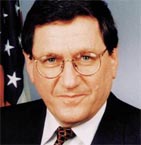Pak tells Holbrooke it wants more aid from the U.S.
 Islamabad, Feb. 11: Pakistan expects more from the United States in return for its cooperation against al-Qaeda and the Taliban, and this message was amply conveyed to President Obama's Special Envoy on Pakistan and Afghanistan, Richard Holbrooke during his meetings with the leadership here.
Islamabad, Feb. 11: Pakistan expects more from the United States in return for its cooperation against al-Qaeda and the Taliban, and this message was amply conveyed to President Obama's Special Envoy on Pakistan and Afghanistan, Richard Holbrooke during his meetings with the leadership here.
Statements issued by both Pakistan President Asif Ali Zardari and Prime Minister Yousaf Raza Gilani after their respective meetings with Holbrooke, emphasized the need to "expedite" a new, multi-billion dollar U. S. aid package, and "the importance of enhanced cooperation in defense and intelligence sharing."
Holbrooke said only that he was there "to listen and learn the ground realities of this critically important country."
According to the Washington Post, the Obama administration sees the Holbrooke visit as a first step to a complex and delicate effort to stabilize Pakistan''s civilian democracy even as it strengthens the Pakistani military and brings it more in sync with U. S. counter-terrorism goals in the region and the war effort in Afghanistan.
According to the paper, the new administration in Washington is formulating a more regional strategy it hopes will arrest the deterioration in the seven-year Afghan war and allow it to move more aggressively against al-Qaeda.
"Not having patience makes all the sense in the world in terms of the Afghanistan threat," Joint Chiefs of Staff Chairman Admiral Michael Mullen said in a recent interview.
But in Pakistan, he said, "there is not a quick answer," and any new U. S. strategy will have to "recognize the tension" between near- and far-term objectives.
The next step, U. S. and Pakistani officials said, will be a visit to the United States later this month by Pakistan's Chief of Army Staff, General Ashfaq Parvez Kayani.
Since last year, senior U. S. military officials have assiduously courted Kayani as the key to making up lost ground in the relationship and persuading the Pakistani military to turn its attention away from the perceived threat from India and toward extremist sanctuaries on the Afghan border.
Pakistan''s weak civilian government is doing its own balancing act.
The Pakistani public is increasingly anti-American and Zardari''s political opponents charge that he is too close to Washington.
Increased U. S. military and civil assistance, the government has argued, will improve Pakistan''s counter-terrorism performance, make it easier to cooperate with U. S. goals, and ensure the survival of the civilian government. (ANI)